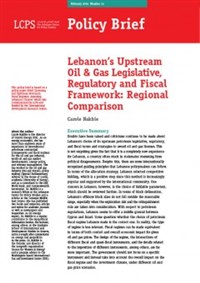Lebanon’s Upstream Oil & Gas Legislative, Regulatory and Fiscal Framework: Regional Comparison

Doubts have been raised and criticisms continue to be made about Lebanon’s choice of its upstream petroleum legislative, regulatory, and fiscal terms and strategies to award oil and gas licenses. This is not surprising given the fact that it is a completely new experience for Lebanon, a country often stuck in stalemates stemming from political disagreements. Despite this, there are some internationally recognized guiding principles that Lebanese policymakers can follow.
This policy brief looks into the choices that Lebanon has opted for in terms of awarding contracts and the upstream petroleum legislative, regulatory, and fiscal regime—whereby the latter includes not only taxes but also instruments such as royalties, bonuses, state participation, and production sharing—and compare them to the strategies followed in Cyprus and Israel. At the time of publishing, the details of Lebanon’s fiscal regime have yet to be finalized. The analysis carried out in this brief is based on the draft Model Exploration and Production Agreement (EPA) that was made available to the author in February 2014. The brief also incorporates information based on comments made by the Lebanese Petroleum Administration (LPA) on the earlier submission of the paper in September 2014, in an attempt to bring it in line with revisions made to the EPA since.
Carole Nakhle
is an LCPS Senior Fellow and CEO of Crystol Energy, an advisory, research, and training company based in London, awarded Best Independent Consultancy Company in 2018 and 2021. She has worked with major energy companies, governments, international organizations, academic institutions, and specialized think tanks on a global scale. Her views on energy matters have appeared in numerous articles in academic journals, newspapers, and magazines. She has published two widely acclaimed books: Petroleum Taxation: Sharing the Wealth and Out of the Energy Labyrinth. Dr. Nakhle was selected “CEO of the Year” (2021) in the UK by CEO Monthly Magazine.
 Doubts have been raised and criticisms continue to be made about Lebanon’s choice of its upstream petroleum legislative, regulatory, and fiscal terms and strategies to award oil and gas licenses. This is not surprising given the fact that it is a completely new experience for Lebanon, a country often stuck in stalemates stemming from political disagreements. Despite this, there are some internationally recognized guiding principles that Lebanese policymakers can follow.
Doubts have been raised and criticisms continue to be made about Lebanon’s choice of its upstream petroleum legislative, regulatory, and fiscal terms and strategies to award oil and gas licenses. This is not surprising given the fact that it is a completely new experience for Lebanon, a country often stuck in stalemates stemming from political disagreements. Despite this, there are some internationally recognized guiding principles that Lebanese policymakers can follow.